 |
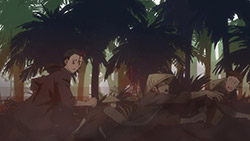 |
 |
 |
 |
 |
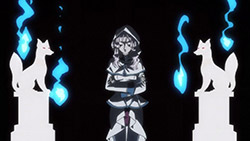 |
 |
 |
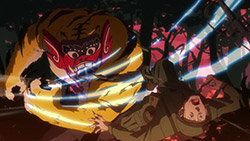 |
 |
 |
 |
 |
 |
 |
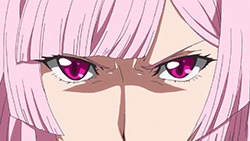 |
 |
 |
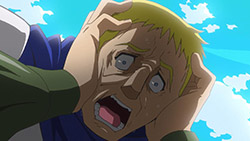 |
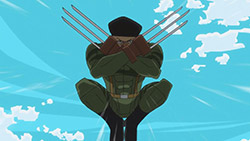 |
 |
 |
 |
 |
 |
 |
 |
 |
 |
 |
 |
 |
 |
 |
 |
「終わりなき戦い」 (Owarinaki Tatakai)
“The Never-Ending Battle”
Well, actually, it’s Rambo. Although they never actually mention the country by name, a war at this time by the Mekong Delta can only mean one thing: the Vietnam War. And so we have a Rambo who has seen things, man, allowing Concrete Revolutio to touch on a topic that I’d never thought would come up in anime: PTSD, and the entire generation of American soldiers who would come home from a failed war broken and unwanted. It’s actually a rather touchy subject that I’m not entirely comfortable with commenting on, since Concrete Revolutio has been fairly consistently critical of the United States (critical of governments and the military as a whole, really), and I’m not an American myself (I’m Australian) so I’m not exactly in tune with how American readers (hi!) feel about all of it. Perhaps a more domestic opinion will speak better to the Western audience, but I’m the only one here, so it’s what we’ll have to work with. I’ll try to refrain from many value judgments and mostly leave Concrete Revolutio to speak for itself, but if you have any comments at all, please do feel free to write on in reply below. While the Concrete Revolutio is usually pretty quiet, I really would like to hear all the voices on the rather complex issues we have this week.
In the alternative history of Concrete Revolutio, the menace that the United States of America wars against in the 20th century was, apparently, not Communism, but ‘bogeys’, what anime would call ‘youkai’. Clearly, this is not the USA that we know of; they describe themselves as the newest country in the world, which is certainly not true in our world (again, I’m Australian). And in Concrete Revolutio they have set themselves up as iconoclasts, destroyers of the old order, when that has, really, been traditionally the commies’ schtick (recently in ‘Things China Pretends Never Happened’: the Cultural Revolution). The common thread though, is this predilection for foreign intervention, and playing ‘world police’. I’m actually somewhat sympathetic to the US on this (though that does not really translate into approval)—in the Cold War, they stared down a rival superpower they framed as the great evil. And then, suddenly, they were gone, and the only superpower left was them. Left with historically unparalleled influence, and a perceived ability to redefine geopolitics, to truly change the world, would it not be irresistibly tempting to at least try?
But the cyborg commander of Concrete Revolutio sounded even madder than that. He literally compared his cause to ethnic cleansing. The ‘bogeys‘ must be eradicated. His country, having overthrown its own gods, is prepared to spread human ascendancy across the globe. It’s sounds all very Nietzsche, and very megalomaniac villain. But in the world of Concrete Revolutio, perhaps it’s not entirely? Remember, if you will, the past four or so episodes of Concrete Revolutio. In Japan, still, the supernatural thrive, and do not exactly have an easy coexistence. In mythology, youkai eat people. That’s their history. I can see why sharing a planet with them makes people uncomfortable, like sharing a pool with a shark would. Do we make friendly with the shark, or do we get a bigger boat and kill it? Concrete Revolutio‘s USA has chosen the latter, and will very willingly do it for you. And to tie it back to the moral questions of Concrete Revolutio, since they see their cause as just, all that stands against them are evil.
The high ideals of the nation, though, do not translate well to the needs of the simple soldier. Concrete Revolutio has also very much been about the individual vs society, and the individual does not win in The Never-Ending Battle either. On the macro scale, the US may be fighting for all mankind, but on a micro scale, lives are destroyed. It’s not just innocents killed, but that in the pursuit of ‘the greater good’, the common man is lost. The best the US military could do for its soldiers here was to have them die as heroes, because there is no way to live like one. Jirou admires the simple desire for power to do good, but Concrete Revolutio illustrates a quandary. When individuals gain power, their scope is only narrow, self-centred issues, like with Human-man, and they clash with each other (and then Shinjuku happens). But the greater good, that tries to subsume all these desires, tramples the individual underfoot. What are we to do? Master Sergeant Jonathan Morrel’s solution, in his madness: even more power, to not just topple the gods but to take their place. Here he is as Shiva, Hindu god of destruction. He directly symbolises, I think, the mindset of humanity in the 20th as it looked at all it has wrought and was filled with terror.
Now I am become Death, the destroyer of worlds.
Preview
 |
 |
 |

Yes, indeed. An delicate theme… But it focused in what a War can make out of the “Heros” fighting in them
The USA may have been unchallenged as the sole superpower of the 90s, although now that’s no longer the case. The newly emergent Chinese and Russians have sprung up as direct rivals to be taken seriously, and the newly emergent terror groups of the Middle East now command enough influence to get their supporters and followers to strike the US and its allies without being a direct world power.
or we could use the history, see what is left of the “Great British Empire!”
While the Russians should be taken seriously, emergent is the opposite of how to describe them. Russia and especially Putin is desperately grasping at what little influence it has left and yearns for the time it was truly a superpower as the Soviet Union. With the sanctions and lower oil prices, Russia has been and will continue to be going down. Their taking of Crimea and the sponsoring and assisting of separatists in Ukraine has only gotten them sanctions that, along with lower oil prices, are destroying their economy. Their intervention in Syria has only bought their sole Middle Eastern ally, Assad, some time and not victory over his enemies or respect from the West for fighting terrorists (it didn’t help on that front that they mainly targeted anti Assad rebels and not ISIS as they said). That doesn’t mean they aren’t dangerous, what with all their nukes. A cornered animal can be dangerous.
How do you people think the series will end? I really can’t imagine the ending.
First, is the series going to end with this second season? If that is the case, well, it’s probably going to end with a solution to the superhuman-superbeing dichotomy, at least for Japan.
I’d also like to know more about the real Japan’s situation in the seventies. In the previous episode we had a Kakuei Tanaka-like political scandal, and now we have Vietnam. Does anyone know something that could be a clue for the ending?
That depends on how well the shows sells. It’s too early to say if the second season is it for the series.
For all their heavy-handed take on American imperialism, they were very subtle and indirect when mentioning the less savoury aspects of Japan’s past. Blink and you’ll miss the references to the experiments of pre-war Japan and their “imperialists”.
Maybe they are daring beyond what other animes have done, but the taboos of Japan’s past are too much, even for Concrete Revolutio. But maybe future episodes can prove me wrong?
We are facing a new divide. Not the one between superheroes and superhumans, which seems repeatedly ignored (especially by Jiro), but the one between superhumans and superbeings who aren’t of human origin. Imperial Arms already hinted it, but now that the Americans support it… yeah, it’s becoming the new “communism” or “islamic extremism” (the enemies that are among us, but are not part of us; we have to root them out from our countries and we have to “save” other countries from their evil influence).
PTSD :: hindsight is so 20/20.
After the “police action” in Vietnam, PTSD was even a diagnosis;
that didn’t happen until the 80’s, more than a decade later. The
vilification of U.S. soldiers began after the My Lai Massacre.
I only point this out to show that that care must be taken when
recounting historical events using modern language. It gives the
appearance that PTSD was known and understood at the time
of the war (which I can tell you first hand, it was not), and the
soldiers were simply treated when they returned home.
Nothing was further from the facts.
Those soldiers had to endure being treated as weak, whiny,
unpatriotic and ungrateful individual slooking for a handout by
their families and peers looking for a handout. They were
complete outcasts and had no access to treatment or help
of any kind.
Very dark chapter in our history.
You are right, but I don’t think this episode gives the feeling that the characters know what PTSD is. The word is never mentioned and both Jiro and detective Shiba are shown to be puzzled by Jonathan’s behaviour. Jiro doesn’t even seem to consider that Jonathan needs more help than just returning home to his family and friends until he sees how unstable he is in the mountain. But he’s no psychologist and by that time it’s too late.
It’s also hinted that the USA army doesn’t know what to do with their superhuman soldiers in that state, locking them in a Japanese base. A sad situation, indeed.
By the way for those who didn’t know already, this episode was scripted by Gen Urobuchi.